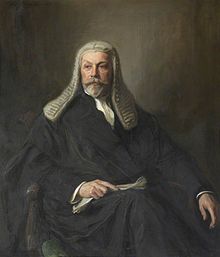
Summary
James William Lowther, 1st Viscount Ullswater, GCB, PC, JP, DL (1 April 1855 – 27 March 1949), was a British Conservative politician. He was Speaker of the House of Commons between 1905 and 1921. He was the longest-serving Speaker of the 20th century.
The Viscount Ullswater | |
|---|---|
 Portrait by Philip de László, c. 1905 | |
| Speaker of the House of Commons of the United Kingdom | |
| In office 8 June 1905 – 28 April 1921 | |
| Monarchs | |
| Preceded by | Sir William Gully |
| Succeeded by | J. H. Whitley |
| Deputy Speaker of the House of Commons Chairman of Ways and Means | |
| In office 1895 – June 1905 | |
| Monarchs | |
| Preceded by | John William Mellor |
| Succeeded by | Sir John Lawson |
| Parliamentary Under-Secretary of State for Foreign Affairs | |
| In office 22 September 1891 – 18 August 1892 | |
| Monarch | Victoria |
| Prime Minister | The Marquess of Salisbury |
| Preceded by | Sir James Fergusson |
| Succeeded by | Sir Edward Grey |
| Member of the House of Lords Lord Temporal | |
| In office 8 July 1921 – 27 March 1949 Hereditary Peerage | |
| Preceded by | Peerage created |
| Succeeded by | The 2nd Viscount Ullswater |
| Member of Parliament for Penrith and Cockermouth | |
| In office 14 December 1918 – 13 May 1921 | |
| Preceded by | constituency established |
| Succeeded by | Cecil Lowther |
| Member of Parliament for Penrith | |
| In office 27 July 1886 – 14 December 1918 | |
| Preceded by | Henry Howard |
| Succeeded by | constituency abolished |
| Member of Parliament for Rutland | |
| In office 1 September 1883 – 18 December 1885 | |
| Preceded by | Gerard Noel |
| Succeeded by | George Finch |
| Personal details | |
| Born | 1 April 1855 |
| Died | 27 March 1949 (aged 93) |
| Nationality | British |
| Political party | Conservative |
| Spouse | Mary Beresford-Hope (d. 1944) |
| Alma mater | King's College London Trinity College, Cambridge |
Background and education edit
The son of Hon. William Lowther, a grandson of William Lowther, 1st Earl of Lonsdale, and for 25 years Member of Parliament for Westmorland, and Alice, 3rd daughter of James Parke, 1st Baron Wensleydale, Lowther was educated at Eton College, King's College London where he took an Associateship degree, and at Trinity College, Cambridge, where he studied classics and law.[1] Lowther became a barrister in 1879, eventually becoming a Bencher of the Inner Temple in 1906.
Political career edit
He was Member of Parliament for Rutland in 1883; contested Mid Cumberland in 1885; and sat for Penrith from 1886 to 1921. He was appointed 4th Charity Commissioner in 1887, and held junior ministerial office as Parliamentary Under-Secretary of State for Foreign Affairs from 1891 to 1892. He was Chairman of Ways and Means and Deputy Speaker from 1895 to 1905 and Speaker of the House of Commons from 1905 to 1921.
There are three golden rules for Parliamentary speakers: Stand up. Speak up. Shut up.
— J. W. Lowther, 1917
Other public appointments edit
Lowther represented Great Britain at the International Conference at Venice in 1892, and at the International Conference on Emigration at Rome in 1924. He was Chairman of the Speakers' Electoral Reform Conference in 1916–1917, of the Buckingham Palace Conference (on the partition of Ulster) in 1914, of the Boundary Commissions (Great Britain and Ireland) in 1917, of the Royal Commission on Proportional Representation in 1918, Devolution Conference in 1919, of the Royal Commission on London Government, 1921–1922; of Review Committee Political Honours, 1923–1924, and Statutory Commission on Cambridge University, 1923; of the Agricultural Wages Board from 1930 to 1940; of the Lords and Commons Committee on Electoral Reform, 1929–1930; and of BBC Enquiry Committee, 1935. He was a Trustee of the British Museum from 1922 to 1931 and a Trustee of the National Portrait Gallery from 1925. In 1907 his portrait was painted by Philip de Laszlo.
Honours edit
He was appointed to the Privy Council in 1898, created 1st Viscount Ullswater, of Campsea Ashe, in the County of Suffolk, on his retirement as Speaker in 1921,[2] and appointed a Knight Grand Cross of the Order of the Bath (GCB) in July 1921.[3] He also held the degrees of DCL from the University of Oxford, LL.D from the University of Cambridge and DCL from the University of Leeds.
Arms edit
|
Family edit
On 1 March 1886, Lowther married Mary Frances Beresford-Hope (d. 16 May 1944). They had three children:[citation needed]
- Major Christopher William Lowther (b. 18 January 1887, d. 7 January 1935).
- Arthur James Beresford Lowther (b. 28 October 1888, d. 2 March 1967)
- Mildred Lowther (b. 1890,[5] d. 2 July 1973)
He was succeeded to the viscountcy by his great-grandson.
Footnotes edit
- ^ "Lowther, James William (LWTR874JW)". A Cambridge Alumni Database. University of Cambridge.
- ^ "No. 32413". The London Gazette. 5 August 1921. p. 6166.
- ^ "No. 32394". The London Gazette. 19 July 1921. p. 5724.
- ^ Debrett's Peerage. 2019. p. 4646.
- ^ England & Wales, FreeBMD Birth Index, 1837–1915
External links edit
- Hansard 1803–2005: contributions in Parliament by James Lowther
- Portraits of James William Lowther, 1st Viscount Ullswater at the National Portrait Gallery, London
- Campsea Ashe garden
- Electoral Reform Conference, 1917
- Proportional Representation Conference, 1918
- Devolution Conference, 1919


